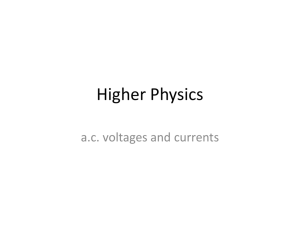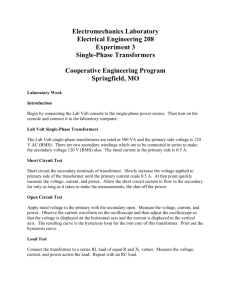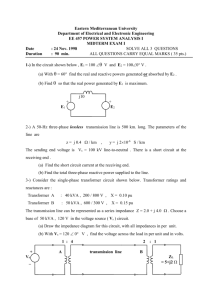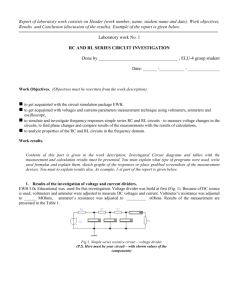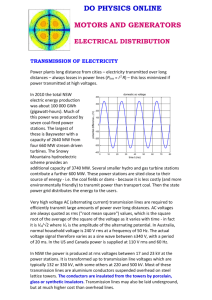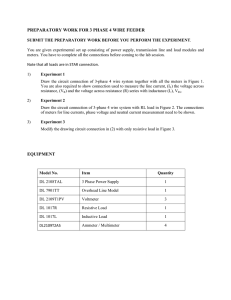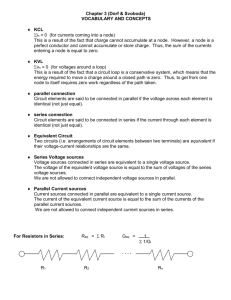Electric Power Observations about Electric Power Distribution
advertisement
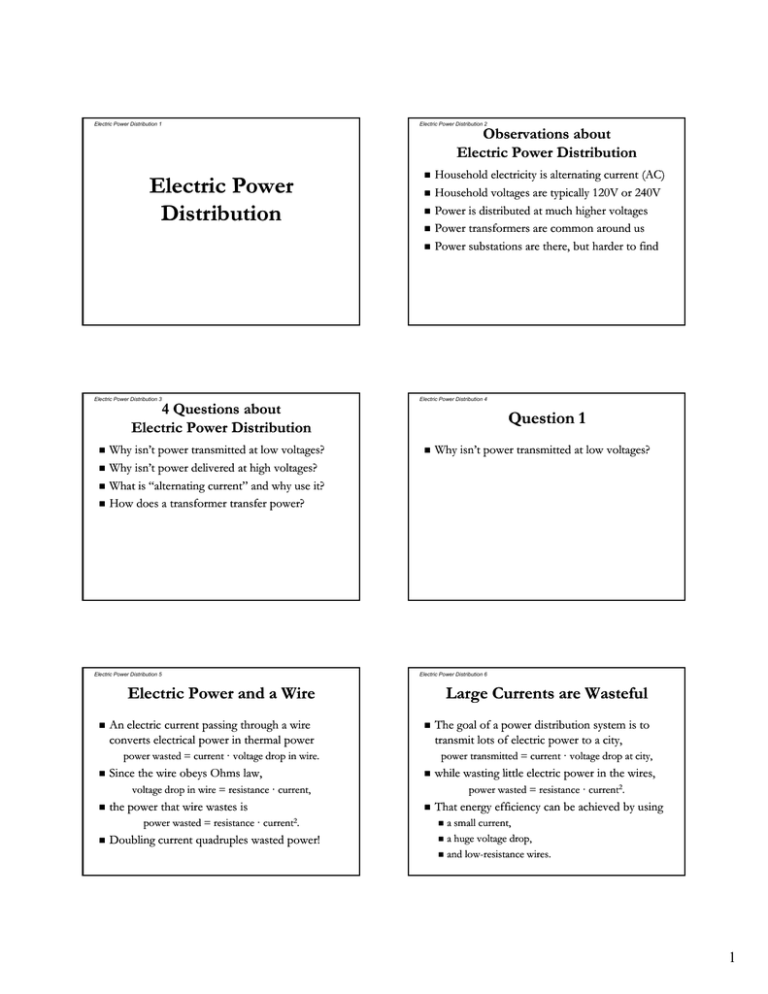
Electric Power Distribution 1 Electric Power Distribution Electric Power Distribution 2 Observations about Electric Power Distribution Electric Power Distribution 3 4 Questions about Electric Power Distribution Why isn’t power transmitted at low voltages? Why isn’t power delivered at high voltages? What is “alternating current” and why use it? How does a transformer transfer power? Electric Power Distribution 5 Household electricity is alternating current (AC) Household voltages are typically 120V or 240V Power is distributed at much higher voltages Power transformers are common around us Power substations are there, but harder to find Electric Power Distribution 4 Question 1 Why isn’t power transmitted at low voltages? Electric Power Distribution 6 Electric Power and a Wire An electric current passing through a wire converts electrical power in thermal power Si Since th the wire i obeys b Oh Ohms llaw, Large Currents are Wasteful The goal of a power distribution system is to transmit lots of electric power to a city, while hil wasting ti littl little electric l t i power in i the th wires, i power wasted = current · voltage drop in wire. power transmitted = current · voltage drop at city, city, power wasted = resistance · current2. voltage drop in wire = resistance · current current,, the power that wire wastes is power wasted = resistance · current2. Doubling current quadruples wasted power! That energy efficiency can be achieved by using a small current, a huge voltage drop, and low low--resistance wires. 1 Electric Power Distribution 7 Electric Power Distribution 8 Question 2 Why isn’t power delivered at high voltages? High Voltages are Dangerous When large voltage drops are available, strong electric fields are present, charges experience enormous forces, and nd currents rr nt ttend nd tto fl flow through thr h unexpected n p t dp paths. th High--voltage electrical power in a home is High a spark hazard, a fire hazard, and a shock hazard. Electric Power Distribution 9 Electric Power Distribution 10 The Voltage Hierarchy Large currents are too wasteful for transmission High voltages are too dangerous for delivery So electric power distribution uses a hierarchy: Question 3 What is “alternating current” and why use it? high-voltage circuits in the countryside highmedium--voltage circuits in cities medium low low--voltage circuits in neighborhoods and homes Transformers transfer power between circuits! Electric Power Distribution 11 Electric Power Distribution 12 Alternating Current (AC) In alternating current, the voltages of the power delivery wires alternate and the resulting currents normally alternate, too. AC and Transformers Alternating Al i voltage l iin the h US completes 60 cycles per second, reversing every 1/120 second. AC has little effect on simple electric devices (e.g., lightbulbs, lightbulbs, space heaters, toasters) AC is a nuisance for electronic devices (e.g., (e g computers, comp ters televisions, televisions sound so nd systems) AC permits the easy use of transformers, which can move power between circuits: from a low low--voltage circuit to a highhigh-voltage circuit from a highhigh-voltage circuit to a lowlow-voltage circuit 2 Electric Power Distribution 13 Electric Power Distribution 14 Question 4 How does a transformer transfer power? Electromagnetism (Version 2) Magnetic fields are produced by magnetic poles (but free poles don’t seem to exist), moving electric charges, and nd changing h n in electric l tri fi fields ld [more [m r llater…]. later…] t r ]. Electric fields are produced by electric charges, moving magnetic poles poles,, and changing magnetic fields fields.. Electric Power Distribution 15 Electric Power Distribution 16 Electromagnetic Induction Moving poles or changing magnetic fields Lenz’s Law produce electric fields, which propel currents through conductors, which p produce magnetic g fields. “When a changing g g magnetic g field induces a current in a conductor, the magnetic field from that current opposes the change that induced it.” Changing magnetic effects induce currents Induced currents produce magnetic fields Electric Power Distribution 17 Lenz’s law predicts the nature of the induced magnetic fields: Electric Power Distribution 18 Transformer Alternating current in one circuit can induce an alternating current in a second circuit A transformer uses induction i d i to transfer power between its circuits but doesn’t transfer any charges between its circuits Current and Voltage A transformer must obey energy conservation Power arriving in its primary circuit must equal power leaving in its secondary circuit Si Since power is i the h product d off voltage l · current, current, a transformer can exchanging voltage for current or current for voltage! 3 Electric Power Distribution 19 Electric Power Distribution 20 Step--Down Transformer Step A step step--down transformer Step--Up Transformer Step has relatively few turns in its secondary coil so charge is pushed a shorter distance and nd experiences p ri n a smaller m ll r voltage lt ri rise A larger current at smaller voltage flows in the secondary circuit Electric Power Distribution 21 A step step--up transformer increases the voltage for efficient longlong-distance transmission A step step--down transformer decreases the voltage for safe delivery to communities comm nities and homes A smaller current at larger voltage flows in the secondary circuit Electric Power Distribution 22 Summary about Electric Power Distribution Power Distribution System A step step--up transformer has relatively many turns in its secondary coil so charge is pushed a longer distance and nd experiences p ri n a llarger r r voltage lt ri rise Electric power is transmitted at high voltages Electric power is delivered at low voltages Transformers transfer power between circuits Transformers require AC power to operate The power distribution system is AC 4
